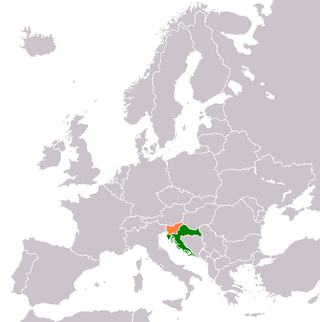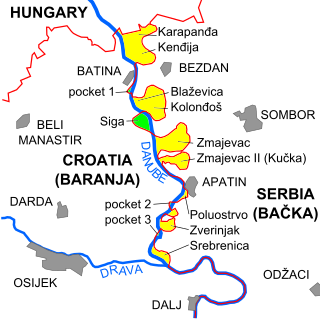
Referendums in the United Kingdom are occasionally held at a national, regional or local level. Historically, national referendums are rare due to the long-standing principle of parliamentary sovereignty. Legally there is no constitutional requirement to hold a national referendum for any purpose or on any issue. However, the UK Parliament is free to legislate through an Act of Parliament for a referendum to be held on any question at any time.
This is the history of Croatia since the end of the Croatian War of Independence.
Regular elections in Croatia are mandated by the Constitution and legislation enacted by Parliament. The presidency, Parliament, county prefects and assemblies, city and town mayors, and city and municipal councils are all elective offices. Since 1990, seven presidential elections have been held. During the same period, ten parliamentary elections were also held. In addition, there were nine nationwide local elections. Croatia has also held three elections to elect members of the European Parliament following its accession to the EU on 1 July 2013.

This is a list of referendums related to the European Union, or referendums related to the European Communities, which were predecessors of the European Union. Since 1972, a total of 48 referendums have been held by EU member states, candidate states, and their territories, with several additional referendums held in countries outside the EU. The referendums have been held most commonly on the subject of whether to become a member of European Union as part of the accession process, although the EU does not require any candidate country to hold a referendum to approve membership or as part of treaty ratification. Other EU-related referendums have been held on the adoption of the euro and on participation in other EU-related policies.

The most recent enlargement of the European Union saw Croatia become the European Union's 28th member state on 1 July 2013. The country applied for EU membership in 2003, and the European Commission recommended making it an official candidate in early 2004. Candidate country status was granted to Croatia by the European Council in mid-2004. The entry negotiations, while originally set for March 2005, began in October that year together with the screening process.

Switzerland is not a member state of the European Union (EU). It is associated with the Union through a series of bilateral treaties in which Switzerland has adopted various provisions of European Union law in order to participate in the Union's single market, without joining as a member state. Among Switzerland's neighbouring countries, all but one are EU member states.

Zoran Milanović is a Croatian politician who serving as the president of Croatia since 2020. Prior to assuming the presidency, he was prime minister of Croatia from 2011 to 2016, as well as the president of the Social Democratic Party (SDP) from 2007 to 2016.

The foreign relations between Croatia and Slovenia are bound together by shared history, neighboring geography and common political ideologies. Both states established diplomatic relations in 1992, following the dissolution of Yugoslavia and the independence of Croatia. Modern relations are warm and friendly. The two states have disputes over their border and sovereign rights over certain nuclear and economic assets. The countries share 670 km (420 mi) of common border. They are perennially each other's largest trading partners on an import-export basis.
Five referendums were held in Switzerland during 2005. The first two were held on 5 June on Switzerland joining the Schengen Area and whether registered partnerships for same-sex couples should be introduced. Both questions were approved. The third was held on 25 September on a federal resolution on extending the agreement on free movement of people to new members of the European Union, and was also approved. The final two were held on 27 November on a popular initiative "for food from an agriculture free of genetic modification" and on a labour law related to the opening times of shops in public transport hubs. Both were approved.

Following the breakup of Yugoslavia in 1991, Slovenia and Croatia became independent countries. As the border between the countries had not been determined in detail prior to independence, several parts of the border were disputed, both on land and at the sea, namely in the Gulf of Piran.

A referendum on the EU accession of the Republic of Croatia was held on 22 January 2012. Croatia finished accession (membership) negotiations on 30 June 2011 and signed the Treaty of Accession on 9 December 2011, setting it on course to become the bloc's 28th member state. The Constitution of Croatia requires that a binding referendum be held on any political union reducing national sovereignty, such as via European Union membership. On 23 December 2011 the Croatian Parliament made a preliminary decision on EU accession and determined that the referendum would be held on 22 January 2012. The 2012 Croatian EU accession referendum was the first referendum held in Croatia since the Croatian independence referendum held more than 20 years earlier, in 1991.
An independence referendum was held in Bosnia and Herzegovina between 29 February and 1 March 1992, following the first free elections of 1990 and the rise of ethnic tensions that eventually led to the breakup of Yugoslavia. Independence was strongly favored by Bosniak and Bosnian Croat voters while Bosnian Serbs boycotted the referendum or were prevented from participating by Bosnian Serb authorities.

Andrej Plenković is a Croatian politician serving as the prime minister of Croatia since October 2016. He was previously one of eleven Croatian members of the European Parliament, serving from Croatia's accession to the European Union in 2013 until his resignation as MEP when he took office as prime minister. Plenković has also been serving as the president of the Croatian Democratic Union since 2016.
A referendum is a direct vote in which an entire electorate is asked to either accept or reject a particular proposal. This article summarises referendum laws and practice in various countries.

Brexit was the withdrawal of the United Kingdom from the European Union.

The border between Croatia and Serbia in the area of the Danube is disputed, an important part of their broader diplomatic relations. While Serbia claims that the thalweg of the Danube valley and the centreline of the river represents the international border between the two countries, Croatia disagrees, claiming that the international border lies along the boundaries of the cadastral municipalities located along the river—departing from the course at several points along a 140-kilometre (87 mi) section. The cadastre-based boundary reflects the course of the Danube which existed in the 19th century, before anti-meandering and hydrotechnical engineering works altered its course. The area size of the territory in dispute is reported variously, up to 140 km2.

A referendum on a bill legalising same-sex marriage was held in Slovenia on 20 December 2015. The bill was rejected, as a majority of voters voted against and the votes against were more than 20% of registered voters.

A second referendum on Scotland becoming independent of the United Kingdom (UK) has been proposed by the Scottish Government. An independence referendum was first held on 18 September 2014, with 55% voting "No" to independence. The Scottish Government stated in its white paper for independence that voting Yes was a "once in a generation opportunity to follow a different path, and choose a new and better direction for our nation". Following the "No" vote, the cross party Smith Commission proposed areas that could be devolved to the Scottish Parliament; this led to the passing of the Scotland Act 2016, formalising new devolved policy areas in time for the 2016 Scottish Parliament election campaign.

2019 European Parliament elections were held in Slovenia on 26 May 2019.

This national electoral calendar for 2022 lists the national/federal elections held in 2022 in all sovereign states and their dependent territories. By-elections are excluded, though national referendums are included.














